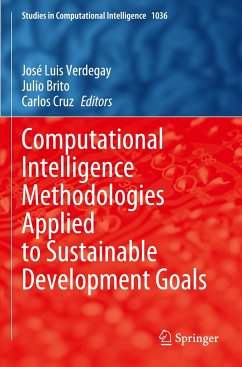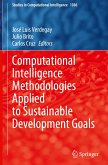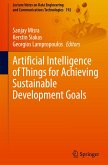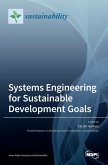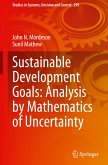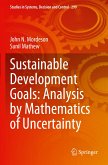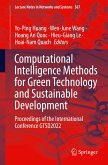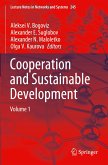Computational Intelligence Methodologies Applied to Sustainable Development Goals
Herausgegeben:Verdegay, José Luis; Brito, Julio; Cruz, Carlos
Computational Intelligence Methodologies Applied to Sustainable Development Goals
Herausgegeben:Verdegay, José Luis; Brito, Julio; Cruz, Carlos
- Broschiertes Buch
- Merkliste
- Auf die Merkliste
- Bewerten Bewerten
- Teilen
- Produkt teilen
- Produkterinnerung
- Produkterinnerung
This book presents computational intelligence methodologies and its applications to sustainable development goals. Along 18 chapters prepared by reputed scientists around the world, this book explores and focuses on the impacts produced by the application of artificial intelligence and mainly of computational intelligence, in sustainable development goals and on analysing how particularly computational intelligence can influence the ability to comply in a timely manner with all the sustainable development goals. Specialists from STEM areas will find in this book an attractive showcase of instances and research lines to be explored. …mehr
Andere Kunden interessierten sich auch für
![Computational Intelligence Methodologies Applied to Sustainable Development Goals Computational Intelligence Methodologies Applied to Sustainable Development Goals]() Computational Intelligence Methodologies Applied to Sustainable Development Goals106,99 €
Computational Intelligence Methodologies Applied to Sustainable Development Goals106,99 €![Artificial Intelligence of Things for Achieving Sustainable Development Goals Artificial Intelligence of Things for Achieving Sustainable Development Goals]() Artificial Intelligence of Things for Achieving Sustainable Development Goals139,99 €
Artificial Intelligence of Things for Achieving Sustainable Development Goals139,99 €![Systems Engineering for Sustainable Development Goals Systems Engineering for Sustainable Development Goals]() Systems Engineering for Sustainable Development Goals85,99 €
Systems Engineering for Sustainable Development Goals85,99 €![Sustainable Development Goals: Analysis by Mathematics of Uncertainty Sustainable Development Goals: Analysis by Mathematics of Uncertainty]() John N. MordesonSustainable Development Goals: Analysis by Mathematics of Uncertainty77,99 €
John N. MordesonSustainable Development Goals: Analysis by Mathematics of Uncertainty77,99 €![Sustainable Development Goals: Analysis by Mathematics of Uncertainty Sustainable Development Goals: Analysis by Mathematics of Uncertainty]() John N. MordesonSustainable Development Goals: Analysis by Mathematics of Uncertainty77,99 €
John N. MordesonSustainable Development Goals: Analysis by Mathematics of Uncertainty77,99 €![Computational Intelligence Methods for Green Technology and Sustainable Development Computational Intelligence Methods for Green Technology and Sustainable Development]() Computational Intelligence Methods for Green Technology and Sustainable Development216,99 €
Computational Intelligence Methods for Green Technology and Sustainable Development216,99 €![¿ooperation and Sustainable Development ¿ooperation and Sustainable Development]() ¿ooperation and Sustainable Development266,99 €
¿ooperation and Sustainable Development266,99 €-
-
-
This book presents computational intelligence methodologies and its applications to sustainable development goals. Along 18 chapters prepared by reputed scientists around the world, this book explores and focuses on the impacts produced by the application of artificial intelligence and mainly of computational intelligence, in sustainable development goals and on analysing how particularly computational intelligence can influence the ability to comply in a timely manner with all the sustainable development goals. Specialists from STEM areas will find in this book an attractive showcase of instances and research lines to be explored.
Produktdetails
- Produktdetails
- Studies in Computational Intelligence 1036
- Verlag: Springer / Springer International Publishing / Springer, Berlin
- Artikelnr. des Verlages: 978-3-030-97346-9
- 1st edition 2022
- Seitenzahl: 316
- Erscheinungstermin: 17. April 2023
- Englisch
- Abmessung: 235mm x 155mm x 18mm
- Gewicht: 482g
- ISBN-13: 9783030973469
- ISBN-10: 3030973468
- Artikelnr.: 67639622
- Herstellerkennzeichnung Die Herstellerinformationen sind derzeit nicht verfügbar.
- Studies in Computational Intelligence 1036
- Verlag: Springer / Springer International Publishing / Springer, Berlin
- Artikelnr. des Verlages: 978-3-030-97346-9
- 1st edition 2022
- Seitenzahl: 316
- Erscheinungstermin: 17. April 2023
- Englisch
- Abmessung: 235mm x 155mm x 18mm
- Gewicht: 482g
- ISBN-13: 9783030973469
- ISBN-10: 3030973468
- Artikelnr.: 67639622
- Herstellerkennzeichnung Die Herstellerinformationen sind derzeit nicht verfügbar.
Part 1: Computational Intelligence and SDG.- A review on the role of computational intelligence on sustainability development.- Fuzzy linguistic summaries for human centric analyses of sustainable development goals (SDG) related to technological innovations.- Impact of Human-Computer Interaction in the Global Sustainable Development Goals.- Part 2: Health control models.- Investigating the key parameters affecting sustainable IoT-based marketing.- Applications of computational intelligence in the studies of Covid-19.- Quantification of ASF introduction risk using OWA operators.- An optimization model for location-allocation of health services under uncertainty.- Computational Intelligence and Tikhonov Regularization with Reduced Dimension Model: Applications in Health, Renewable Energy and Climate Heat Transfer Inverse Problems.- Part 3: Emission control models.- Intelligent collaborative freight distribution to reduce greenhouse gas emissions: a review.- Pressure Sensor Placement forLeak Location in Zones of a WDN.- Forecasting tropospheric ozone concentrations using deep neural networks and wavelets: a case study of a tropical coastal-urban area in Brazil.- Power Curve Estimation of Wind Farms with Imprecise Data by Fuzzy Quadratic Programming.- Effect of the growth of carbon emissions as a function of GDP per capita and its relationship with the SDG in american and european countries: An application of neural networks.- Part 4: Transportation and distribution models.- A fuzzy approach for organizational transportation aligned with the Sustainable Development Goals: health promotion, inequality reduction, and responsible consumption.- A VND to Solve the Bi-objective Tourist Trip Design Problem with Fuzzy Constraints and Reducing CO2.- A Multi-Objective Solid Transportation Problem in Sustainable Development.- On the Generation of Alternative Solutions for a Perishable Food Distribution Problem.- Solving two-stage multi-objective transportation problem using goalprogramming and its application to sustainable development.
Part 1: Computational Intelligence and SDG.- A review on the role of computational intelligence on sustainability development.- Fuzzy linguistic summaries for human centric analyses of sustainable development goals (SDG) related to technological innovations.- Impact of Human-Computer Interaction in the Global Sustainable Development Goals.- Part 2: Health control models.- Investigating the key parameters affecting sustainable IoT-based marketing.- Applications of computational intelligence in the studies of Covid-19.- Quantification of ASF introduction risk using OWA operators.- An optimization model for location-allocation of health services under uncertainty.- Computational Intelligence and Tikhonov Regularization with Reduced Dimension Model: Applications in Health, Renewable Energy and Climate Heat Transfer Inverse Problems.- Part 3: Emission control models.- Intelligent collaborative freight distribution to reduce greenhouse gas emissions: a review.- Pressure Sensor Placement forLeak Location in Zones of a WDN.- Forecasting tropospheric ozone concentrations using deep neural networks and wavelets: a case study of a tropical coastal-urban area in Brazil.- Power Curve Estimation of Wind Farms with Imprecise Data by Fuzzy Quadratic Programming.- Effect of the growth of carbon emissions as a function of GDP per capita and its relationship with the SDG in american and european countries: An application of neural networks.- Part 4: Transportation and distribution models.- A fuzzy approach for organizational transportation aligned with the Sustainable Development Goals: health promotion, inequality reduction, and responsible consumption.- A VND to Solve the Bi-objective Tourist Trip Design Problem with Fuzzy Constraints and Reducing CO2.- A Multi-Objective Solid Transportation Problem in Sustainable Development.- On the Generation of Alternative Solutions for a Perishable Food Distribution Problem.- Solving two-stage multi-objective transportation problem using goalprogramming and its application to sustainable development.

